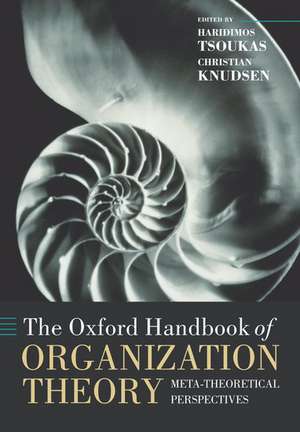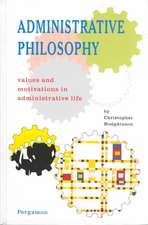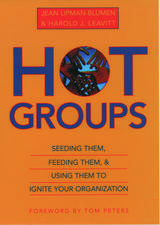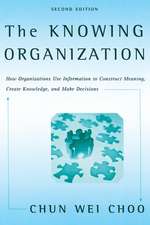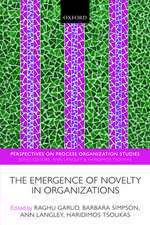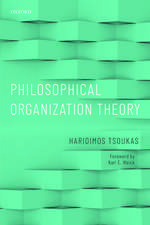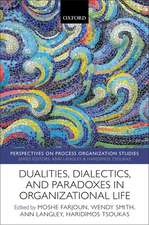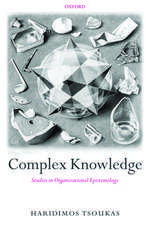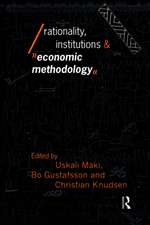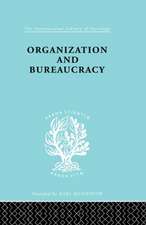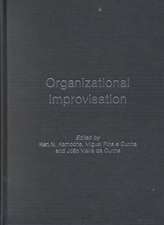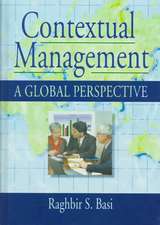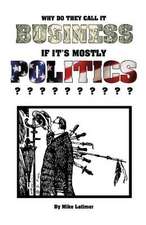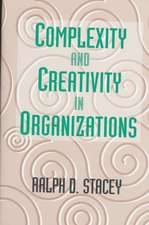The Oxford Handbook of Organization Theory: Oxford Handbooks
Editat de Haridimos Tsoukas, Christian Knudsenen Limba Engleză Paperback – 10 mar 2005
| Toate formatele și edițiile | Preț | Express |
|---|---|---|
| Paperback (1) | 341.00 lei 31-37 zile | |
| OUP OXFORD – 10 mar 2005 | 341.00 lei 31-37 zile | |
| Hardback (1) | 1151.72 lei 31-37 zile | |
| OUP OXFORD – 20 mar 2003 | 1151.72 lei 31-37 zile |
Din seria Oxford Handbooks
-
 Preț: 236.89 lei
Preț: 236.89 lei - 8%
 Preț: 358.80 lei
Preț: 358.80 lei - 17%
 Preț: 912.51 lei
Preț: 912.51 lei - 12%
 Preț: 307.94 lei
Preț: 307.94 lei - 25%
 Preț: 829.05 lei
Preț: 829.05 lei - 14%
 Preț: 987.01 lei
Preț: 987.01 lei - 26%
 Preț: 1376.97 lei
Preț: 1376.97 lei - 29%
 Preț: 929.22 lei
Preț: 929.22 lei -
 Preț: 303.54 lei
Preț: 303.54 lei - 26%
 Preț: 343.85 lei
Preț: 343.85 lei - 14%
 Preț: 278.15 lei
Preț: 278.15 lei - 29%
 Preț: 930.94 lei
Preț: 930.94 lei - 30%
 Preț: 1065.79 lei
Preț: 1065.79 lei - 15%
 Preț: 357.85 lei
Preț: 357.85 lei -
 Preț: 263.45 lei
Preț: 263.45 lei - 23%
 Preț: 839.81 lei
Preț: 839.81 lei - 16%
 Preț: 264.39 lei
Preț: 264.39 lei - 33%
 Preț: 737.68 lei
Preț: 737.68 lei - 33%
 Preț: 725.45 lei
Preț: 725.45 lei - 26%
 Preț: 342.76 lei
Preț: 342.76 lei - 25%
 Preț: 366.95 lei
Preț: 366.95 lei - 13%
 Preț: 304.72 lei
Preț: 304.72 lei - 16%
 Preț: 263.35 lei
Preț: 263.35 lei - 12%
 Preț: 267.23 lei
Preț: 267.23 lei - 33%
 Preț: 815.51 lei
Preț: 815.51 lei - 6%
 Preț: 346.76 lei
Preț: 346.76 lei - 22%
 Preț: 1095.69 lei
Preț: 1095.69 lei - 29%
 Preț: 931.18 lei
Preț: 931.18 lei - 29%
 Preț: 942.77 lei
Preț: 942.77 lei - 24%
 Preț: 1071.82 lei
Preț: 1071.82 lei - 23%
 Preț: 1052.07 lei
Preț: 1052.07 lei - 21%
 Preț: 863.03 lei
Preț: 863.03 lei - 30%
 Preț: 815.25 lei
Preț: 815.25 lei - 29%
 Preț: 855.42 lei
Preț: 855.42 lei - 30%
 Preț: 842.04 lei
Preț: 842.04 lei - 11%
 Preț: 258.32 lei
Preț: 258.32 lei - 29%
 Preț: 859.51 lei
Preț: 859.51 lei - 29%
 Preț: 1083.61 lei
Preț: 1083.61 lei - 15%
 Preț: 273.41 lei
Preț: 273.41 lei - 30%
 Preț: 818.12 lei
Preț: 818.12 lei - 11%
 Preț: 365.23 lei
Preț: 365.23 lei - 21%
 Preț: 359.87 lei
Preț: 359.87 lei - 13%
 Preț: 264.87 lei
Preț: 264.87 lei - 9%
 Preț: 307.08 lei
Preț: 307.08 lei - 28%
 Preț: 845.79 lei
Preț: 845.79 lei - 23%
 Preț: 855.11 lei
Preț: 855.11 lei - 21%
 Preț: 861.04 lei
Preț: 861.04 lei - 12%
 Preț: 250.34 lei
Preț: 250.34 lei
Preț: 341.00 lei
Preț vechi: 406.88 lei
-16% Nou
Puncte Express: 512
Preț estimativ în valută:
65.25€ • 68.13$ • 53.88£
65.25€ • 68.13$ • 53.88£
Carte tipărită la comandă
Livrare economică 04-10 aprilie
Preluare comenzi: 021 569.72.76
Specificații
ISBN-13: 9780199275250
ISBN-10: 0199275254
Pagini: 672
Ilustrații: Illustrations
Dimensiuni: 171 x 246 x 33 mm
Greutate: 1.17 kg
Ediția:Revised
Editura: OUP OXFORD
Colecția OUP Oxford
Seria Oxford Handbooks
Locul publicării:Oxford, United Kingdom
ISBN-10: 0199275254
Pagini: 672
Ilustrații: Illustrations
Dimensiuni: 171 x 246 x 33 mm
Greutate: 1.17 kg
Ediția:Revised
Editura: OUP OXFORD
Colecția OUP Oxford
Seria Oxford Handbooks
Locul publicării:Oxford, United Kingdom
Recenzii
...brings together an extraordinary and erudite range of conributions to which I expect to refer for many years to come. There is not a single chapter from which I did not learn something, and from many I learnt a great deal.
Imagine a restaraunt where all your favourite dishes are prepared, each by a master chef, and unknown delights also await your pleasure. You do not have to go anywhere to get to this restaraunt, it is right in your own kitchen. You can even take it to the office with you. Without too much exaggeration, this is the rough equivalent of what is offered to the student of organization theory in The Oxford Handbook of Organization Theory
The Oxford Handbook [of Organization Theory] can be returned to many times to reflect on assumptions held on what organizations are, on what good science is, and on who should be the end customer for ones scientific activities ... This is the big tent depiction of organizational studies as a civilized community building an increasingly relevant narrative on organizations pertinent to more and more people. It is hip. It is current. It is self-consciously aware of the forces that shape as it grows.
Imagine a restaraunt where all your favourite dishes are prepared, each by a master chef, and unknown delights also await your pleasure. You do not have to go anywhere to get to this restaraunt, it is right in your own kitchen. You can even take it to the office with you. Without too much exaggeration, this is the rough equivalent of what is offered to the student of organization theory in The Oxford Handbook of Organization Theory
The Oxford Handbook [of Organization Theory] can be returned to many times to reflect on assumptions held on what organizations are, on what good science is, and on who should be the end customer for ones scientific activities ... This is the big tent depiction of organizational studies as a civilized community building an increasingly relevant narrative on organizations pertinent to more and more people. It is hip. It is current. It is self-consciously aware of the forces that shape as it grows.
Notă biografică
Haridimos Tsoukas is the George D. Mavros Research Professor of Organization and Management at ALBA in Greece, and Professor of Organization Theory and Behaviour at the University of Strathclyde Graduate School of Business, UK. Previous positions held include Lecturer at Warwick Business School (1990-5), and Associate Professor at the University of Cyprus.Christian Knudsen is a Research Fellow at Copenhagen University and Århus Business School, Associate Professor at Copenhagen Business School, Visiting Professor at the Swedish Collegium for Advanced Studies in the Social Sciences, and Visiting Fellow at the London School of Economics and Stanford University.
